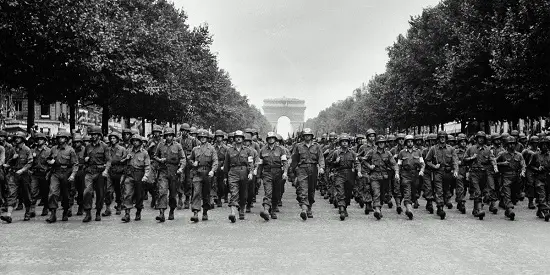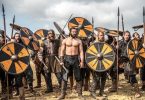| Today, the 3000 mile boundary between Canada and the United States is known as “the longest undefended boundary in the world”. |
| But for three years in a row: 1812, 1813 and 1814, U.S. armies invaded Canada. |
| When both sides failed to win a clear victory, |
| and the costs of the war kept growing, |
| the two countries decided that peace was the best policy. |
| On June 18, 1812, the United States declared war on Great Britain. |
| The United States had proclaimed their independence from Britain in 1776, 36 years earlier. |
| There were still bad feelings between the two countries. |
| Great Britain was not treating the United States as an equal independent country. |
| British ships were stopping American ships from trading with Europe. |
| British sailors went aboard American ships looking for deserters from the British Navy. |
| If an American sailor could not prove that he was an American, he was taken to work for the British. |
| At the same time, the population of the United States was expanding. |
| Americans wanted to move west into lands held by various American Indian tribes. |
| Some Americans felt that Britain was encouraging the Indians to fight them and was supplying guns to the Indians. |
| In 1812, Canada was made up of a small number of British colonies just north of the American border. |
| Americans felt it would be easy to take over Canada; |
| then Canadian land would provide homes for their growing population. |
| Since Americans outnumbered Canadians ten to one |
| the U.S. government thought that no one in Canada would dare oppose them. |
| Moreover, Britain was fighting a terrible war in Europe against Napoleon, the Emperor of France, |
| and could not spare any troops to help defend Canada. |
| But, in 1812, Canada had one advantage over the U.S.A., good leadership. |
| British General Isaac Brock had served in Canada for ten years. |
| He knew how to inspire both his own soldiers and the ordinary people of Canada to fight for their country. |
| He was a bold and energetic leader who moved quickly to attack American positions before they could attack him. |
| Brock found a valuable ally in the American Indian Chief Tecumseh. |
| Tecumseh had been trying to unite the scattered groups of Indians to fight together against American expansion. |
| He convinced the Indians that their best chance for success was to join the British and Canadians against the Americans. |
| Although both Brock and Tecumseh were killed in battles, |
| their example continued to inspire the defenders of Canada to fight against the American invasions. |
| Before the end of 1814, all American forces had been driven out of Canada. |
| By 1814, Britain had defeated the French Emperor Napoleon. |
| Now it was the turn of the United States to be invaded. |
| A large British force attacked the heart of the United States, |
| and burned the government buildings at Washington. |
| Another British force attacked the U.S.A. near the mouth of the Mississippi River, |
| but it was defeated at the Battle of New Orleans. |
| Both sides were tired of fighting by this time, |
| and a peace treaty was signed on December 24, 1814. |
| This agreement restored everything to the way it had been when the war began. |
| Although this really meant that no one had won the war, |
| both sides claimed victory. |
| The Americans felt that they had gained full recognition of their independence. |
| Britain would no longer board their ships, or encourage the Indians to fight them. |
| Canadians felt that they had shown Americans |
| that they wanted to develop their own country in their own way, separate from the United States. |
| But the biggest result of the war was the decision by both countries never to fight each other again. |
More English listening lessons for intermediate level:
Lesson 75: Stephen Foster: American Songwriter





